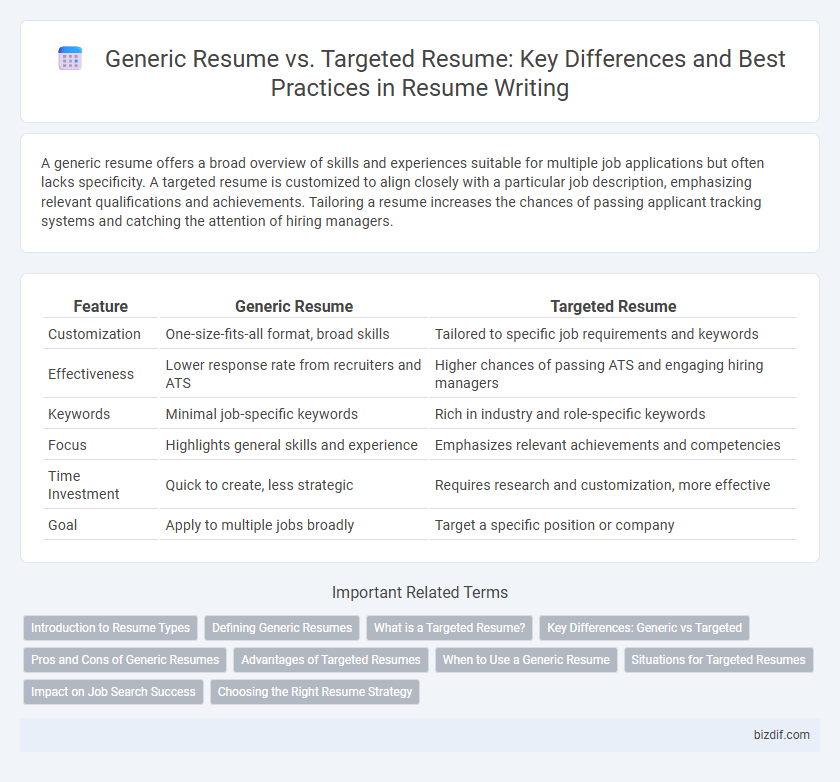A generic resume offers a broad overview of skills and experiences suitable for multiple job applications but often lacks specificity. A targeted resume is customized to align closely with a particular job description, emphasizing relevant qualifications and achievements. Tailoring a resume increases the chances of passing applicant tracking systems and catching the attention of hiring managers.
Table of Comparison
| Feature | Generic Resume | Targeted Resume |
|---|---|---|
| Customization | One-size-fits-all format, broad skills | Tailored to specific job requirements and keywords |
| Effectiveness | Lower response rate from recruiters and ATS | Higher chances of passing ATS and engaging hiring managers |
| Keywords | Minimal job-specific keywords | Rich in industry and role-specific keywords |
| Focus | Highlights general skills and experience | Emphasizes relevant achievements and competencies |
| Time Investment | Quick to create, less strategic | Requires research and customization, more effective |
| Goal | Apply to multiple jobs broadly | Target a specific position or company |
Introduction to Resume Types
A generic resume provides a broad overview of skills and experience suitable for multiple job applications, while a targeted resume is customized to highlight qualifications directly relevant to a specific job role or industry. Targeted resumes increase the chances of passing Applicant Tracking Systems (ATS) by incorporating keywords aligned with the job description. Choosing the appropriate resume type depends on the job seeker's strategy and the desired level of personalization in showcasing professional achievements.
Defining Generic Resumes
A generic resume provides a broad overview of skills, experience, and qualifications without customization for a specific job or industry. It serves as a foundational document that can be adapted for various applications, highlighting transferable skills and general achievements. This type of resume tends to be less effective in standing out to recruiters compared to targeted resumes tailored to particular roles.
What is a Targeted Resume?
A targeted resume is specifically tailored to match the job description and required skills of a particular position, emphasizing relevant experience and achievements. It highlights keywords and qualifications that align with the employer's needs, increasing the chances of passing Applicant Tracking Systems (ATS). This focused approach enhances visibility and demonstrates a clear fit for the role, making it more effective than a generic resume.
Key Differences: Generic vs Targeted
A generic resume provides a broad overview of skills and experiences designed to apply to multiple job roles, while a targeted resume is tailored specifically to match the requirements of a particular job description, emphasizing relevant accomplishments and keywords. Targeted resumes improve applicant tracking system (ATS) compatibility by incorporating industry-specific terminology and quantifiable achievements, boosting the chances of passing initial screenings. Generic resumes may save time but often lack the precision needed to stand out in competitive job markets.
Pros and Cons of Generic Resumes
Generic resumes offer versatility by allowing job seekers to apply quickly to multiple positions without customization, saving time and effort. However, they often lack specificity and fail to highlight tailored skills, reducing the chances of passing applicant tracking systems (ATS) or grabbing the attention of recruiters. While useful for initial job searches or networking, generic resumes generally deliver lower response rates compared to targeted resumes designed for specific roles.
Advantages of Targeted Resumes
Targeted resumes enhance job application success by aligning skills and experiences directly with specific job requirements, increasing relevance to hiring managers and applicant tracking systems (ATS). They showcase key accomplishments and qualifications tailored to the position, improving the likelihood of securing interviews. This strategic customization demonstrates genuine interest and professionalism, setting candidates apart from those using generic resumes.
When to Use a Generic Resume
A generic resume is best suited for applying to a wide range of jobs when the candidate's skills and experiences are broadly applicable across multiple industries or roles. It allows for quick submission to numerous employers without tailoring, saving time during large-scale job searches or career exploration. Use a generic resume when the job requirements are not highly specific, and the goal is to generate more interview opportunities through volume.
Situations for Targeted Resumes
Targeted resumes are most effective when applying to specific job openings that require tailored skills and experiences directly aligned with the job description. They excel in competitive industries such as technology, healthcare, and finance, where precise qualifications and keywords boost applicant tracking system (ATS) rankings. Job seekers changing careers or pursuing specialized roles benefit from targeted resumes by highlighting relevant transferable skills and industry-specific achievements.
Impact on Job Search Success
Targeted resumes significantly increase job search success by aligning skills and experiences with specific job descriptions, making applicants more attractive to hiring managers. Generic resumes often struggle to highlight relevant qualifications, resulting in lower interview callbacks. Tailoring each resume to match the desired role's keywords and requirements enhances applicant tracking system (ATS) compatibility and improves visibility.
Choosing the Right Resume Strategy
Choosing the right resume strategy depends on your job search goals and industry requirements. A generic resume provides a broad overview of skills suitable for multiple roles, while a targeted resume emphasizes specific qualifications and achievements tailored to a particular job description, increasing relevance and response rates. Effective resume writing prioritizes keyword optimization aligned with applicant tracking systems (ATS) to enhance visibility to recruiters.
Generic Resume vs Targeted Resume Infographic

 bizdif.com
bizdif.com